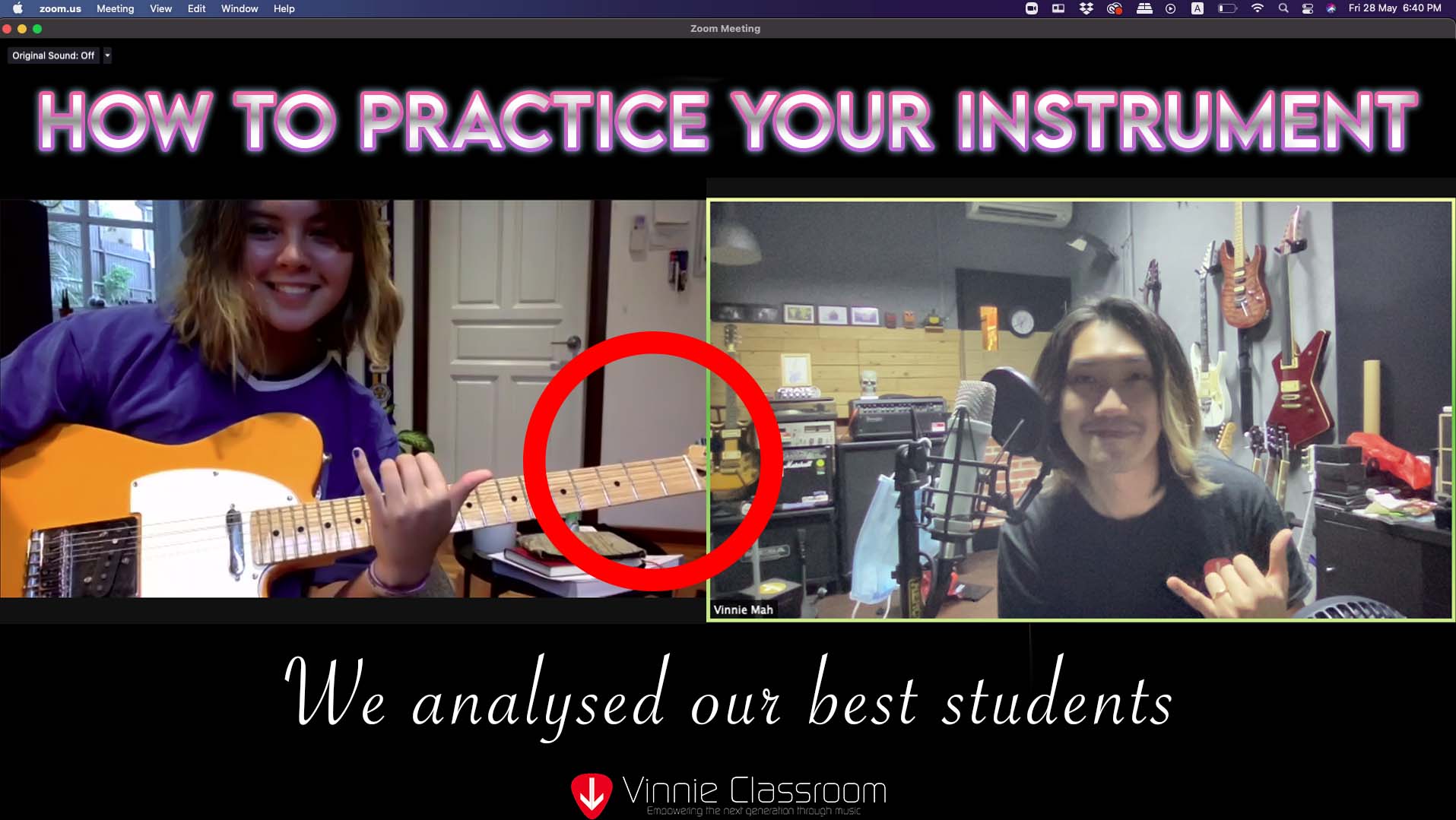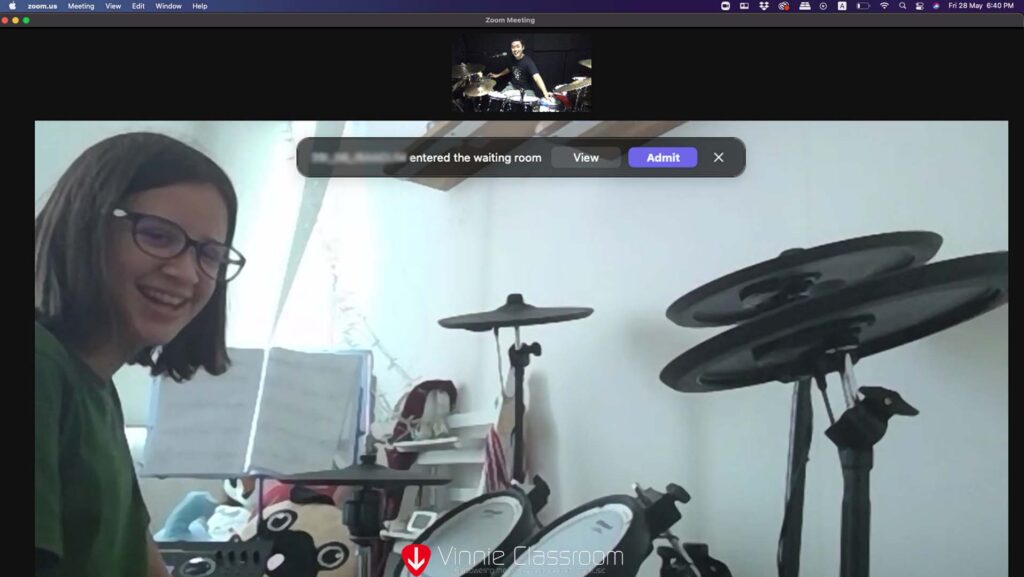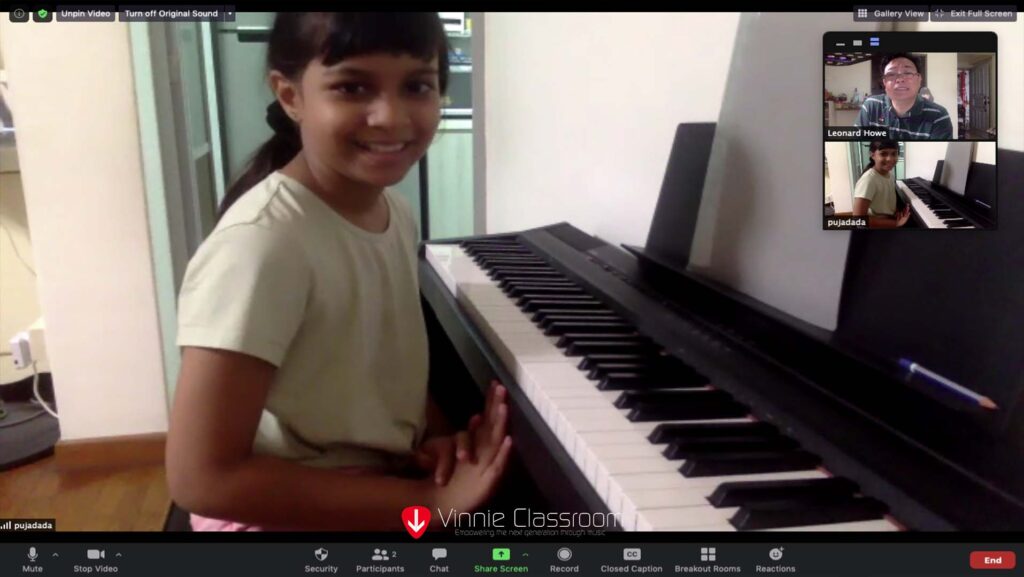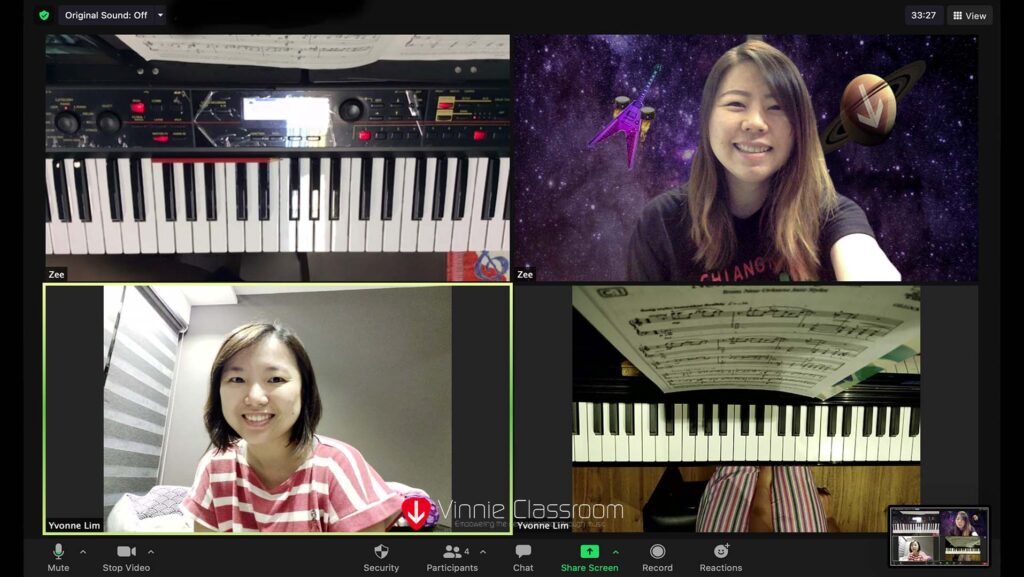
How to practice your instrument
 The question of “how to practice your instrument” is perhaps one that has been asked many times but often ignored. Here in Vinnie Classroom, we see a fair share of students who are able to grow steadily on their instrument and those who are pretty much stagnant. Hence, we decide to write this article about the common excuses and how to tackle them. This article aims to help those who feel that they are in limbo with their instrument to get better!
The question of “how to practice your instrument” is perhaps one that has been asked many times but often ignored. Here in Vinnie Classroom, we see a fair share of students who are able to grow steadily on their instrument and those who are pretty much stagnant. Hence, we decide to write this article about the common excuses and how to tackle them. This article aims to help those who feel that they are in limbo with their instrument to get better!
I need a better instrument

Our student doing drum lesson over Zoom video conference
While this is true to a certain extent, it is often not the case why you are not improving on your instrument. Music teachers around the world have been proving the fact that we are able to perform the same passage on both the student’s instrument and our very own workhorse. But that’s not to say it will be easy to make it sound good on the cheaper made instruments. The key here is understanding and tunning yourself to the instrument you have on hand. Every instrument has a slightly different setup and feels, this in return requires you to adjust your playing habits to accommodate. So no, don’t go shopping for a more expensive instrument until you understand what you are shopping for.
I don’t have time to practice

Our student doing piano lesson over Zoom video conference
Time indeed is tough to manage for many of us. School students, especially those in Singapore, struggles to find time out of their heavy load of school work. Adults are often filled with commitments they must fulfill before setting aside time to indulge themselves with their instruments. However, times and times again, we have seen students who ace in their academics doing really well on their instruments. We also have working adults with kids progressing steadily despite their tight schedule. So what’s their secret?
Perhaps the most important ingredient when it comes to time management isn’t how well you plan your day. It is about addiction. How addicted you are to improve on the instrument?
Some of our students see practicing their instrument as a form of relaxation from their schoolwork. They aim to finish their schoolwork swiftly to earn more time on their instrument. This does not equate to filling in the blanks on that pesky homework with random answers. That will often stall them, resulting in more time needed in correction work. Instead, they make sure they understand their subject well and do it with a clear mind.
Working adults does things with a different approach, they plan their schedule properly. Setting aside valuable time during the day to clock some mileage in. It could be when their children are showering, the few minutes in the morning before they head for work, or even right before dinner is served. Again, the concept is still the same. It boils down to how much do you want to improve on your instrument. Clocking in the mileage is a sure-fire way to getting better.
I did practice but I am not improving!

Our student doing piano lesson over Zoom video conference with multi camera angle for better experience
If you did all of the above and are still not improving, then we need to dive into your practice routine. After all, we are diving deep into understanding how to practice your instrument in this post! Many of our students who are confident they practiced but not showing results, often practiced wrongly. Yes, there are specific ways to get that effective and efficient practice in.
- Do not play the song from the start till the end!
This is a typical mistake that students do. The idea they have is as long as they played all those notes on the score, they have practiced. Well technically yes they did practice but they merely practice how to relate the note on the score to the note on their instrument. Often times ignoring timing, technique, articulation, and dynamics. So if you are guilty of doing this, stop. Instead, zoom in down to just a few bars at a time. Work on them until you are able to perform them perfectly. Once you are ready, you can then add more bars to that practice routine. Eventually, you will be playing the song from start till the end but with a very clear mind of every aspect of the music.
- Do not practice without a metronome
Metronome is likely a student’s worse nightmare. Every so often, a student will blurt out “can we do without the metronome”. Understandably so, the metronome is a merciless machine that embarrasses you as soon as you are out of time. Syncing to the metronome can be a mammoth task for many. So why do we want to practice with a metronome and how?
For a start, a band can only function if everyone is able to play together. The timekeeper will always be the drummer. The band will sound bad no matter how well everyone is playing if the main timekeeper is unstable. Solo instrumentalist, however, enjoys the liberty of performing a song in Rubato. So unless you want to be performing alone, time to practice with a metronome!
Assuming you have never practiced with a metronome, start off by working on scales. Scales are a great way to help you tighten your playing to a metronome because the notes are fixed and you have already memorized them by heart. This means your ears, more likely the brain, have more capacity to hear if the notes and the metronome clicks are locked in together.
The clicks will disappear underneath your notes when you are in sync with the metronome.
From there on, practicing without the metronome will feel almost alien. The most basic metronome clicks to the main tempo but the more advanced metronome allows for subdivisions. Meaning, you can now set it to click on every quaver instead of crotchet, or if you need to practice some triplets, or if the time signature is at 5/4. Ultimately, a good musician will be able to hear both the metronome and the notes they play at the same time. They can combine the 2 information together to get perfect sync to the tempo. So dust off your metronome and start practicing with it today!
I now mastered “How To Practice Your Instrument”
Hold up! While we wish to congratulate you that you’ve understood all that you need to do to be practicing your instrument effectively and efficiently, this article has not covered every aspect of it. It merely is a rough guide to getting better. Practicing an instrument, like any other things you wish to perfect, requires a lifetime of dedication. It requires a lot of motivations too and motivation can come from various factors. Fame, money, or personal skill accomplishment? Understanding why you want to improve on your musicality is perhaps the start of why you want to read this article in the first place.
Looking for music lessons? Click here! for a Free Trial Lesson with us!

